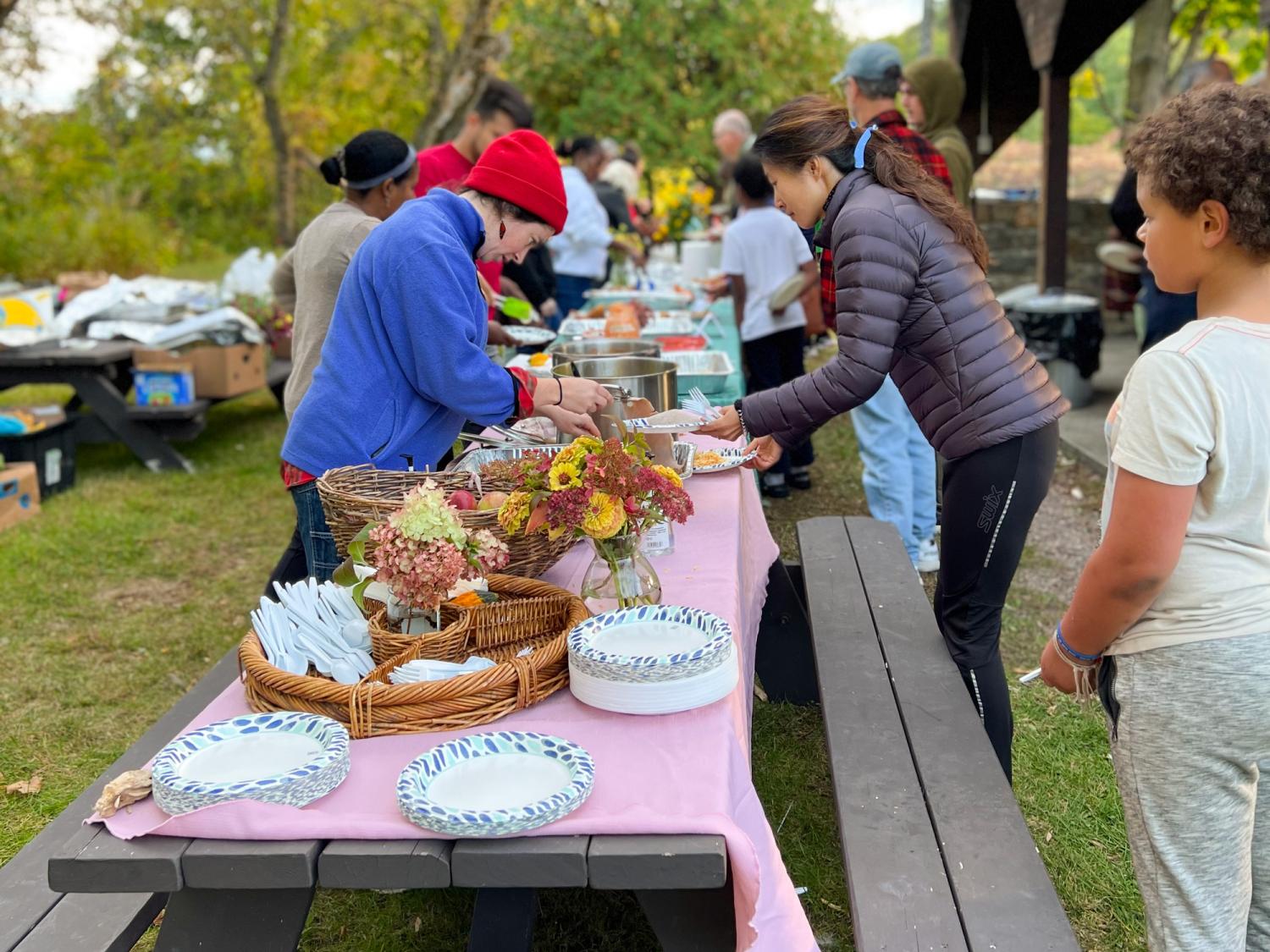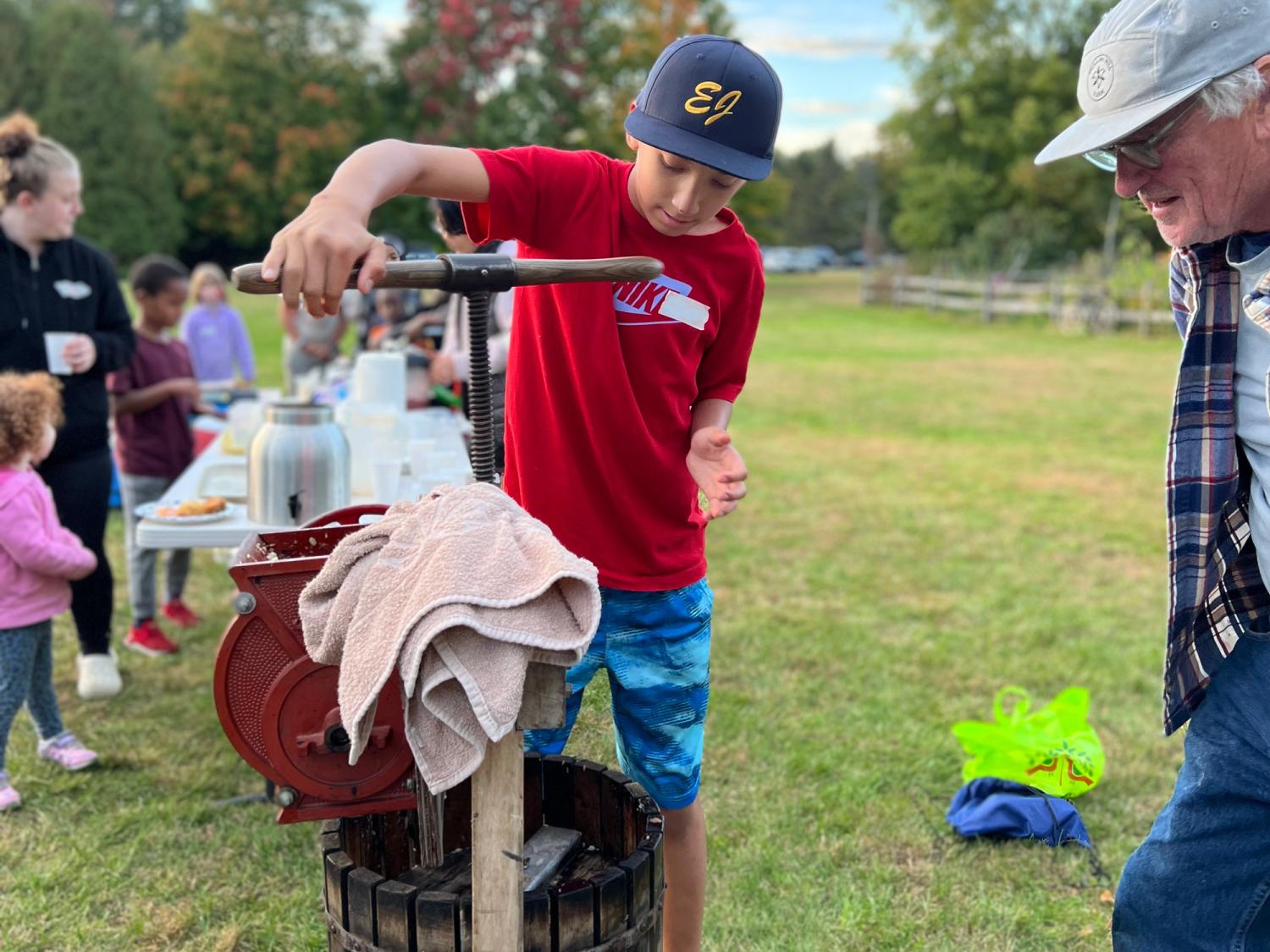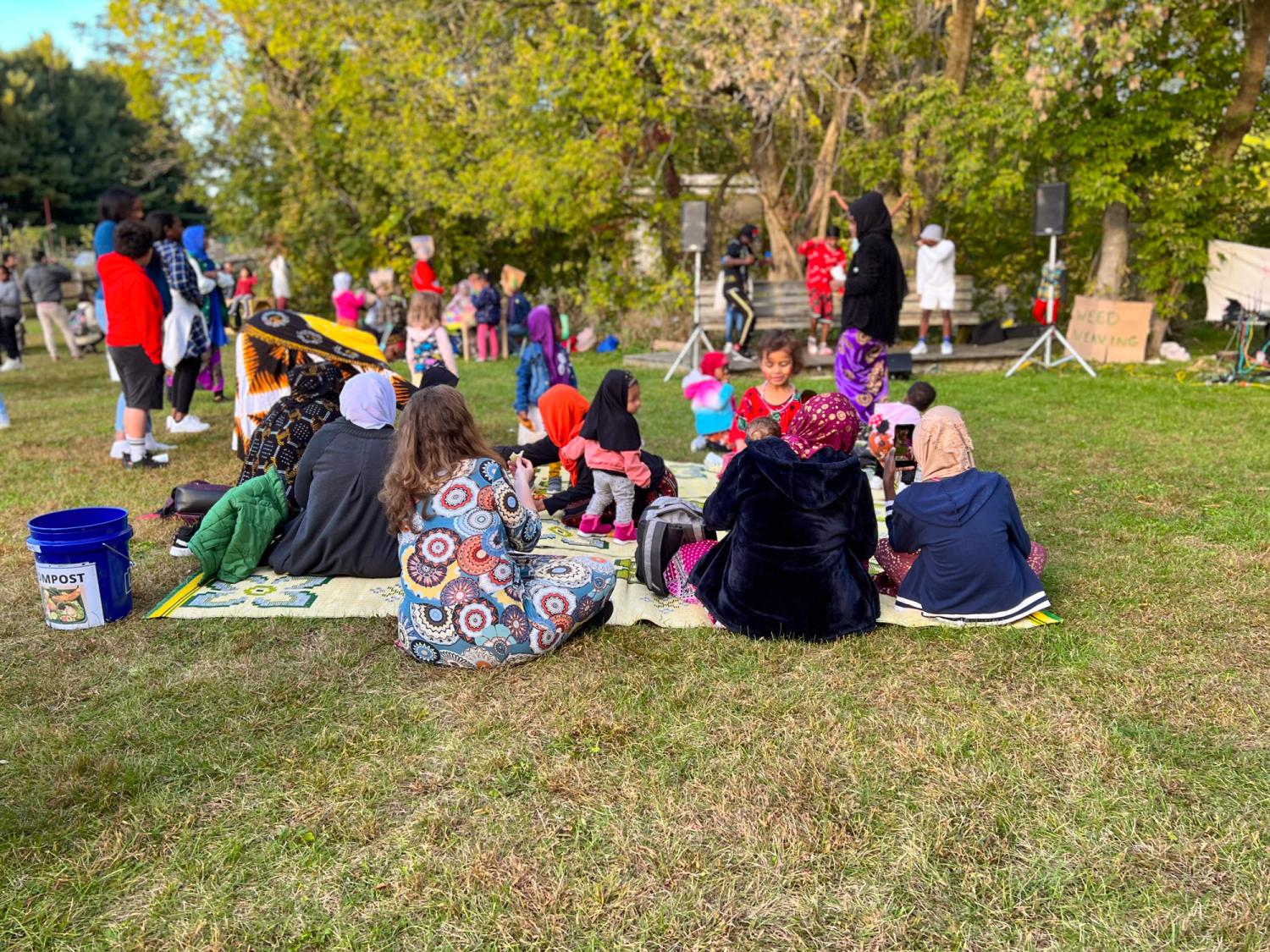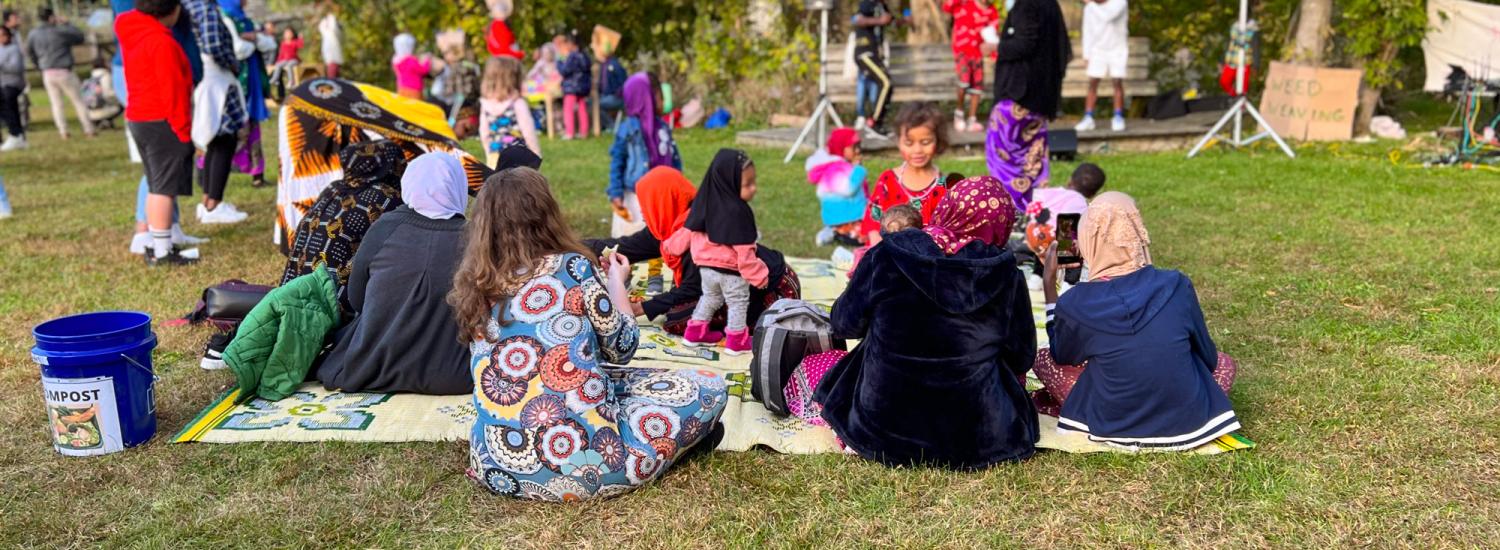By connecting young children with fresh, locally sourced food, farm to early childhood programs are not only supporting their health and development, but also creating ripple effects that benefit communities and local food systems.
Momos & Samosas!
On the day before the Family Supper, the bustling kitchen of the Janet Munt Family Room is filled with the enticing aroma of spices and freshly prepared dishes. Parents, community members, and staff work side by side, crafting traditional momos and samosas, while laughter, conversations, and storytelling in various languages create a vibrant atmosphere. The children, supervised and engaged by attentive staff, explore the gardens and participate in outdoor activities, as they share in the anticipation of the upcoming celebration. This year's preparations are extra special, as a local family has generously donated a goat to be shared and savored by all.
As the day of the Family Supper arrives, excitement is in the air. Families gather at the picturesque Ethan Allen Homestead, laden with their homemade dishes, ready to share their culinary heritage with the community. A long, inviting food line forms, as everyone eagerly awaits the chance to sample the myriad of flavors from around the world. The festive atmosphere is amplified by the rhythmic sounds of live music, the sweet scent of freshly pressed cider, and the smiling faces of old friends and new acquaintances mingling together. As the evening unfolds, the party carries on into the night, a heartfelt testament to the power of food, culture, and community in bringing people together.

A Community Resource for All Ages
The Janet Munt Family Room is a parent-child center located in Burlington offering a range of services to families with young children, such as early care, playgroups, parent support and education, home visits, and community development.
Many of the center's programs involve farm to early childhood activities, including the Family Play at the Gardens program, which provides care and activities for children, gardening support and workshops for adults, and access to shared or individual garden plots for the season. To ensure accessibility for all families, transportation and meals are also provided. These community garden programs provide families with control over their own food production, promoting food sovereignty and building strong networks of mutual support. English classes or tutors are also sometimes available, which enables families to learn gardening, food, and cooking vocabulary in a real-life context. This immersive approach can improve fluency and engagement in language learning.
During the COVID-19 pandemic, the Family Room stepped up to support families in need by delivering locally sourced and gleaned food to over 150 families per week. This service has since transformed into an on-site pantry to increase food security within the community. It offers a wider range of produce and farm shares, including culturally relevant items like green amaranth, bitter melon, and African eggplant. The pantry offerings were informed by research conducted during the food box distribution, which identified items that were meaningful to New Americans and reminded them of home. These specialty vegetables are now grown by Digger’s Mirth and Intervale Community Farm.
Through partnerships with Feeding Chittenden, the Vermont Land Trust, and the Vermont Food Bank, the Family Room has been able to provide families with a unique resource: a goat certificate that allows them to have a goat slaughtered in a culturally relevant way for religious or cultural festivals. These goats are raised at Pine Island Community Farm by a Bhutanese family who came to Vermont as refugees in 2009.

The Secret Ingredient
The Janet Munt Family Room has a secret ingredient that makes its programs truly exceptional: a deep understanding of the importance of food in sustaining health, community, and culture. Through its farm to early childhood initiatives, the Family Room provides families with access to culturally relevant foods, which fosters a sense of belonging and helps to sustain the unique cultural practices of New American families. The Family Supper and other food-related events promote intercultural exchange and celebration, bringing families from all backgrounds together to share in the joy of food in a community where all can feel supported, valued, and empowered. By recognizing the power of food to connect people across cultures, the Family Room is building a stronger, more resilient community that authentically celebrates diversity and helps all families to thrive.
-
-
Benefits to Families:
- Access to culturally relevant produce and food that reminds them of home and supports a feeling of rootedness and comfort in a foreign land.
- Opportunities for hands-on learning and exploration for both children and adults through cooking projects, recipe sharing, and community gardening.
- Building community and relationships through shared experiences, such as family suppers and partnerships with local organizations.
- Learning from each other and appreciating food and culture from different perspectives.
- Promoting family health and mental wellness through gardening and outdoor activities.
- Access to resources and referrals to additional community supports for the full family.
-
Benefits to Communities:
- Increased food security in the community through access to locally grown, fresh and nutritious food through the pantry, farm shares and community events.
- Cultivation of community engagement and building relationships through community events like the Family Supper and volunteering at the Homestead.
- Building a more cohesive and resilient community through cultural exchange and sharing of diverse foods and traditions.
- Greater social connections and networks through opportunities for families to come together, share experiences, and build relationships.
- Strengthened local food system through reciprocal learning, market expansion, diversification of culturally sustaining crops, and keeping local dollars in the local economy.
-

Families enjoy a shared meal and the time to be with community during at the Family Supper. Photo courtesy Janet Munt Family Room. Talk to Jackie, or Centers Like Hers
- Connect with Janet Munt Family Room Preschool Director Jackie Reno: [email protected]
- Connect with the Vermont Farm to Early Childhood Coalition via Shelburne Farms Farm to Early Childhood Partnership Manager Cynthia Greene: [email protected]
Connect to Organizations
- Vermont Farm to School & Early Childhood Network: networking information, regional partner organizations, resources, and updates on Vermont’s efforts to promote farm to school and early childhood initiatives statewide.
- Northeast Organic Farming Association of Vermont: find and connect with producers
- National Farm to School Network Resources: a sortable database of resources
Apply for Professional Learning Programs & Grants
- Northeast Farm to School Institute: Vermont FEED’s unique year-long professional learning opportunity for selected school, district, or early childhood teams from New England and New York.
- Vermont Agency of Agriculture Food and Markets’ Farm to School and Early Childhood Grants Program: financial and technical assistance to schools or early childhood education organizations looking to develop or expand their farm to school programs.
- KidsGardening: garden grants, curriculum, and educator workshop resources.
The Association of State Public Health Nutritionists' Farm to ECE grantee programs are supported by the Centers for Disease Control and Prevention (CDC) of the United States (U.S.) Department of Health and Human Services (HHS), as one of several projects funded by cooperative agreement number NU38OT000279 (total of $6,320,000). This resource was supported by ASPHN's Farm to ECE grantee program, which is funded by the Division of Nutrition, Physical Activity and Obesity (DNPAO)/ National Center for Chronic Disease Prevention and Health Promotion (NCCDPHP)/CDC/HHS. The contents of this resource are those of the author(s) and do not necessarily represent the official views of, nor an endorsement by DNPAO/NCCDPHP/CDC/HHS, or the U.S. government.
